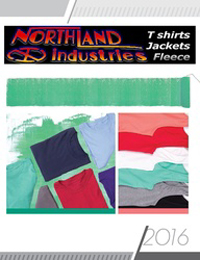
Whether you want a Classic-fitting garment, a more Tailored fit, something Slim or a Longer body, we can help. Look for these icons to identify the fit for you.
Unisex fitted silhouette- a more fashionable look.
A more generous cut than a Slim Fit- a relaxed, feminine silhouette.
Very tapered, fitted silhouette for a slimmer female body type.
Added length for a longer, more stylish cut than a traditional silhouette.
Yarn made by spinning together shorter cotton fibers to create a basic, value-priced fabric. Generally less expensive than ring-spun garments.
Yarn made by spinning together longer fibers that have gone through a process of removing impurities to create a strong, soft fabric. Generally higher quality than open-end cotton garments.
Yarn made by spinning together longer fibers that have gone through a process of removing impurities while aligning the fibers to create the strongest, softest cotton fabric. Generally the highest quality cotton garments.
A t-shirt with a solid body featuring a ribbed crew neck and sleeve bands in a contrasting color.
A type of tank that is cut to reveal the wearer's shoulders and shoulder blades, making a T-shaped back.
A women's garment with sleeves cut in one piece with the body of the garment.
A style of sleeve extending to the collar of a garment instead of ending at the shoulder, sewn with diagonal seams.
A collar that is constructed from the same material as the garment.
A collar constructed of rib knit fabric with vertical rows of raised ridges. Features more elasticity than a self-collar.
A double row of stitching at the hemline.
Shoulder seams as well as the neck seam are covered by fabric tape or binding, to reinforce this area and reduce separation.
A style of sleeve sewn into the shoulder seam. The seam is curved to accommodate fit and is connected to the shoulder seam and side seam as opposed to diagonal from the neck, as in raglan sleeves.
Apparel that is dyed in garment form rather than in raw fabric form, that fades over washing, giving the garment a vintage look. It is a flexible and useful type of dyeing, as batches can be done in custom colors and in various quantities from small to large.
Fabric dye that forms chemical bonds with the fabric, promoting color fastness, allowing the fabric to withstand sunlight and laundering without fading or running during the normal life of the garment.
A chemical process where cotton fibers dissolve, leaving polyester fibers intact, creating a semitransparent design.
Measures density of fabric, used to describe polyester. The smaller the number of denier, the thinner the strand of polyester, the larger the number, the thicker the strand.
A thicker fabric in which the pile on the underside is cut and brushed, resulting in a soft hand.
A terry fabric identified by uncut loops on one side and a smooth surface on the other.
A soft knitted fabric with a smooth finish, most commonly used to make a t-shirt.
A loosely woven or knitted fabric made of 100% polyester that has a number of closely spaced holes. Frequently used for sports jerseys as it is extra-breathable, and provides superior color fastness without shrinkage.
A type of rayon made from beech wood fibers. Soft, smooth, breathes and drapes well, keeps its shape and is resistant to shrinkage, fading and pilling. Very absorbent with the ability to dye easily.
A weaving style that is characterized by raised parallel cords creating a textured surface similar to a waffle weave.
An ultra-soft blend of cotton and polyester that is finer than a traditional 100% cotton and has superior draping.
A manufactured fiber derived from plants. It is found in products where soft, smooth surfaces and luster are important.
A form of knit fabric with vertical rows of knitting loops. This fabric features more elasticity than jersey knit and is commonly used in crew necks, cuffs, etc.
An exceptionally plush, soft and squishy fabric fleece, usually made of a blend including polyester and rayon.
A medium weight fabric that looks and feels like cotton, but is made by spinning 100% polyester fibers into yarns.
A fabric blend of cotton, polyester and rayon lending superior softness and a flattering drape.
A method of applying a design to dyed fabric by printing a colordestroying agent, such as chlorine or hydrosulfite, to bleach out a white or light pattern on the darker colored garment. Discharge screen printing can be used to print colors on dark garments that in the past would have required an additional layer of white ink in order to achieve proper opacity of top colors. Garment must be cotton-rich.
Screen printing is the most cost and time effective way to produce large quantities of prints. Squeegees push ink through a pre-made mesh screen to transfer ink onto a garment except areas that are made impermeable by a special blocking. The resulting design has long-lasting, vibrant colors that will withstand multiple washes.
Embroidery is the craft of forming decorative designs with thread and needle. The resulting design retains its distinctive, professional look after repeated washings.
Direct-to-Garment printing (DTG) designs are digitally printed onto the garment. This method allows for images as detailed as photographs to be printed with a full range of subtly graded colors.
The process of applying material with a heat adhesive background with a heat press. Heat-applied materials contain a heat-sensitive adhesive on one side; when heat is applied by a heat press to the material, the material adheres to the garment to which it is being applied.
Sublimation printing is a technique that uses a heat press to transfer designs printed on transfer paper to polyester-rich garments. The heat press sublimates the solid-state ink in the printed transfer paper to a gas that bonds to the polyester fibers of the garment. This allows for potential seam-to-seam, full-color, even photo-realistic print that won't fade or crack, even after multiple washings.